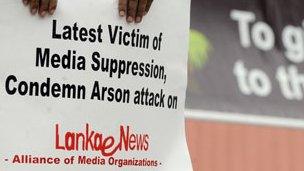Sri Lanka blocks websites for 'maligning' president
- Published

The Sri Lankan government has warned that any website dealing with Sri Lankan affairs must register with the government or face legal action.
It comes after officials say a number of websites have already been blocked because they have engaged in "character assassination" of the president.
Access to at least six news websites has been blocked by Sri Lanka in the past few days.
Critics say the move adds to an established pattern of web censorship.
The sites that have been blocked include a new website of the main opposition United National Party, and another website whose premises were burnt out earlier this year.
The secretary to the media ministry said that the sites were blocked because they had maligned the president, ministers and top government officials.
He told the Lankadeepa newspaper that any website giving information about the country, wherever in the world it operated, should register with his ministry or else face legal action.
But a senior opposition figure, Mangala Samaraweera, said this requirement was "absurd" and described the government as "paranoid".
Sophisticated computer users can reach sites banned by the government through proxies.
But the move shows that there are definite limits to what this government will tolerate.
The country has a history of internet censorship.
A pro-Tamil Tiger site, Tamilnet, has been blocked almost continuously since 2007, while other sites critical of the government have been banned on and off.
A government supporter told the BBC that even though the physical war ended two years ago, the propaganda war continued because of the public relations campaign by the Tamil diaspora which still believes in Tamil separatism.
A Paris-based campaign group, Reporters Without Borders, says that online journalists and media are still targeted with violence in Sri Lanka and the perpetrators enjoy impunity.
The group has in the past criticised the two biggest service providers in Sri Lanka for allowing the censoring of websites.
- Published31 March 2011
- Published31 January 2011
- Published22 February 2010
- Published31 January 2010